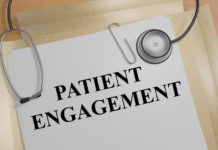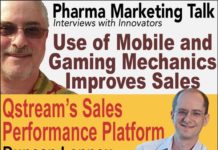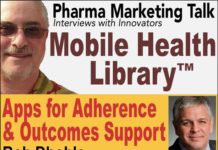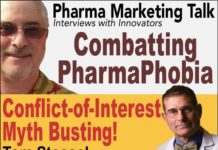Live Speaker Programs are an Endangered Species: Employ Technology to Evolve and Flourish Click Here for Additional Resources
A conversation with William D. Cooney (see bio), President and CEO, MedPoint Communications, Inc., who laid out the problems of face-to-face speaker programs in today’s regulatory, cost-conscious, and busy work-schedule environment. Cooney gave examples of the many benefits of using technology to deliver and manage speaker programs.
Aired LIVE on:
Thursday, January 15, 2009 Listen to internet radio with Pharmaguy on Blog Talk Radio
You may also visit this Pharma Marketing Talk Segment Page to listen to the audio podcast.
This show and ALL Pharma Marketing Talk shows are available as podcasts via PMT on iTunes (FREE!).
BackgroundHealthcare professionals participate in pharmaceutical company-sponsored speaker programs “in order to help educate and inform other healthcare professionals about the benefits, risks and appropriate uses of company medicines,” according to PhRMA’s newly-revised Guidelines for Interactions with Healthcare Professionals (see PMN Reprint #77-01 for an analysis of the code and survey results). Invitations to speaker programs also help pharmaceutical sales reps gain access to hard-to-see physicians.
Speaker programs usually occur at restaurants where company-trained speakers deliver a presentations about specific drugs. While providing “modest meals” at speaker programs is permitted by the Code, it is getting more and more difficult to induce busy physicians to attend such meetings in person. The Code has limited perks that physicians can get from these programs beyond the education. They cannot bring their spouses, for example, as they used to do in the past. Nor are the meetings held at posh resorts with travel expenses re-imbursed.
Another factor contributing to the fall-off in live speaker programs is the expense involved. Not just the “modest meals” involved, but also the expense of paying the travel and other costs involved in bringing the speakers to far-flung venues — even if these venues are no longer posh resorts.
Clearly, the live speaker program is becoming an endangered species within the pharma marketing ecosystem.
In a report entitled “Pharmaceutical Speaker Programs: Building the Business,” Best Practices, LLC, noted the employment of the Internet and emerging technologies as key drivers of service quality, efficiency and cost control in speker programs.>.
Questions/Topics Discussed- The cost of live dinner meetings per physician
- The dwindling number of physicians attending live dinner meetings and why
- Other factors affecting live dinner meetings, including regulatory issues, etc.
- An introduction to the benefits
Guest Bio
 Bill Cooney launched his career in 1982 as a field representative for Wyeth. In 1983 Bill joined the marketing department at Abbott, Pharmaceutical Products Division. Over a period of five years Bill worked in various marketing and sales management positions at Abbott, notably as Business Unit Manager for the Depakote brand.
Bill Cooney launched his career in 1982 as a field representative for Wyeth. In 1983 Bill joined the marketing department at Abbott, Pharmaceutical Products Division. Over a period of five years Bill worked in various marketing and sales management positions at Abbott, notably as Business Unit Manager for the Depakote brand.
In 1990, Bill founded MedPoint Communications, where he continues to serve as President and CEO. Bill has overseen the growth of MedPoint into a leading medical education and communications group serving global pharmaceutical and biotechnology companies.
MedPoint was among the earliest digital media developers in healthcare, and innovated the TelePoint WebConferencing system in 1993, years ahead of the next entrant in the medical industry. MedPoint is continues to be an innovator in medical eMedia such as healthcare ePortals, hybrid eMeetings and eSpeaker programs.
Bill has an MBA from the Fisher College of Business of the Ohio State University, and a BA from the University of Virginia.
Additional Resources
- N/A









![6 Digital Tools at the Center of Healthcare Digitalization [INFOGRAPHIC]](http://ec2-54-175-84-28.compute-1.amazonaws.com/pharma-mkting.com/wp-content/uploads/2021/04/6DigitalTools_600px-100x70.jpg)




